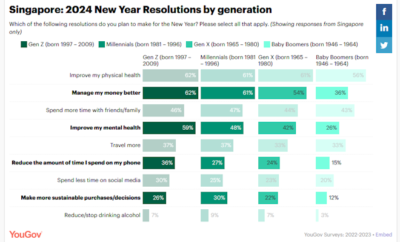
Health x Wellness
Fitbit’s New Sleep Schedule Feature Encourages Healthier Sleeping Habits
Fibit’s new, personalised Sleep Schedule feature helps users achieve a more consistent pattern of sleep.
According to the Institute of Medicine (US) Committee on Sleep Medicine and Research, sleep plays a vital role in our health as it helps protect us against cardiovascular disease, diabetes and obesity; while helping to boost neurocognitive functions, mental health and longevity.
While many may understand the benefits and importance of a good night’s sleep for their health, getting adequate sleep (7 to 9 hours) regularly and consistently still appears to be a challenge.
To help users improve their sleep consistency and overall health, Fitbit has recently introduced a new set of sleep tools:
- Sleep Goal: Users can follow the app’s personalised recommendations (based on sleep data from their Fitbit tracker) or set a target number of hours to make sure they get enough sleep each night.
- Bedtime and Wake Up Targets: Based on users’ sleep goals and past sleep behaviours from their Fitbit tracker, the app will recommend target bedtime and wake up times. Users can customise these to suit their personal preferences and schedule.
- Bedtime and Wake Up Reminders: Users can receive push notification reminders on their smartphone to help them reach their sleep goals and go to bed and wake up more consistently. A silent wake alarm can also be set on their Fitbit tracker based on their wake up target.
- Sleep Schedule History Chart: Users can track their sleep consistency over time to determine if they have met their goals or if they need to adjust their sleep schedule.
These tools are also the first in a series of new sleep features developed in collaboration with Fitbit’s new panel of sleep experts – Drs. Michael Grandner from the University of Arizona, Allison Siebern from Stanford University, and Michael Smith from Johns Hopkins University.
According to Fitbit’s sleep experts, constantly changing our sleep routine has the same effect as jetlag as the circadian rhythm (internal clock) is continually changed, which can negatively impact our health and wellness. In contrast, getting sufficient sleep each night and being consistent with when we go to sleep and wake up each day can improve our physical performance, mental health and cognitive functions.
Fitbit data also suggests a correlation between consistent bedtimes and daily active minutes – especially for users who go to bed early every night. Users who sleep an average of seven to nine hours every night also have a lower body mass index (BMI) than those who sleep only three to four hours per night.
The new Sleep Schedule feature is now available on the free Fitbit app for Android, iOS and Windows devices; and works with all Fitbit devices that automatically track sleep.









